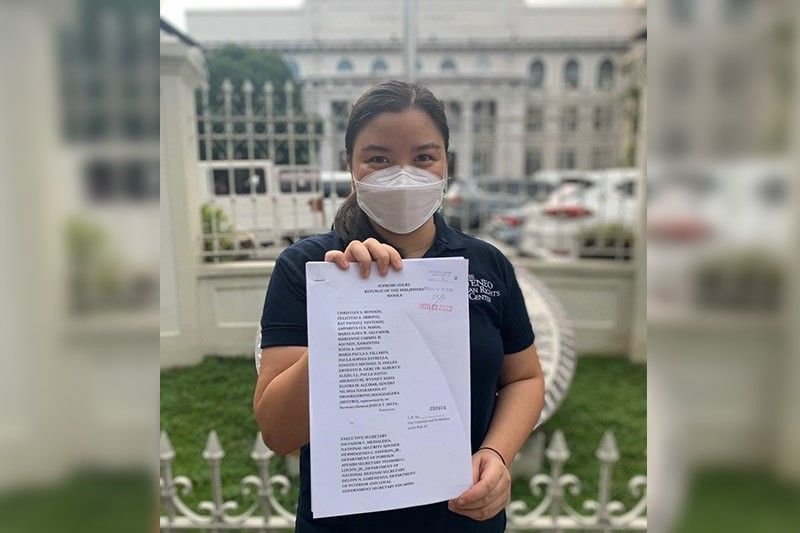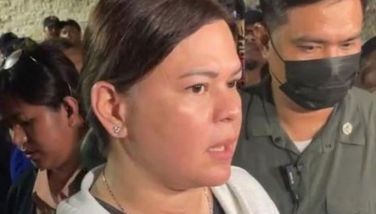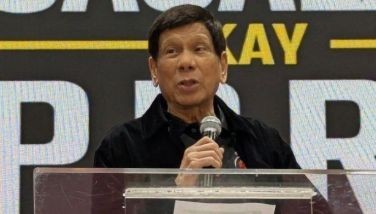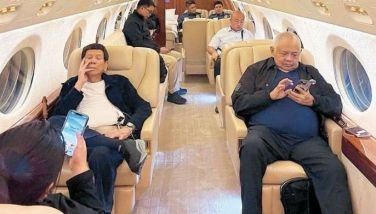Framers of the Constitution join legal challenge against Anti-Terrorism Act of 2020

MANILA, Philippines — The luminaries behind the 1987 Constitution asked the Supreme Court to strike down provisions of the contentious Anti-Terrorism Act of 2020 as unconstitutional for putting at risk the rights of the people.
In less than a week since the Palace announced the signing of the law, the Anti-Terrorism Act of 2020 faced at least six challenges to its constitutionality before the highest court of the land.
Christian Monsod and Felicitas Arroyo, Framers of the Constitution, filed the latest petition as they asked the SC to declare sections of Republic Act 11479 that define terrorism and secondary offenses, that empowers the Anti-Terrorism Council to designate suspected terrorists and that allows detention for up to 24 days without judicial charge.
READ: Framers of Constitution oppose anti-terrorism law
Unlike the previously filed five petitions, Monsod’s petition does not ask for the issuance of a temporary restraining order, but the declaration as void and the permanent prohibition on implementation of the said sections of the law.
In some of the past decisions of the high court, such as in the landmark Ifurung vs Carpio Morales in 2018 on the length of term of an ombudsman, the SC considered the discussion and intent of the framers when they crafted the present Constitution in resolving petitions.
The framers are joined by professors from the Ateneo Law School, Ateneo Human Rights Center, and Xavier University College of Law; Fr. Albert Alejo; and Sentro ng mga Nagkakaisa at Progresibong Mangagawa.
“There is no doubt that RA 11479 imperils the constitutional rights of our citizens. Its provisions are a lure to abuse and misuse, a magnet to power-wielding and vindictive government officials; as well as to lackeys who have no other intent but to please the powers-to-be,” their petition read.
Law as weapon to harass perceived critics
They recalled that police filed multiple criminal complaints such as conspiracy to commit sedition against dozens of individuals perceived as critics of the government. The respondents in the complaint over the “Ang Totoong Narcolist” video blogs include Vice President Leni Robredo and co-petitioner Alejo,
“Considering the nature of the crime against him, under the ATA, [Fr. Alejo] can be arrested and detained without judicial warrant for a period of 14 days, renewable for another 10 days on mere suspicion by the ATC, based on its own determination of probable cause,” they said.
As the prosecution resolved the police’s complaint, only 11 out of the more than 30 respondents were brought to court for supposedly conspiring to discredit Duterte.
The petitioners also recalled how military officials, in particular, have been engaged in red-tagging in 2018 when the Armed Forces of the Philippines accused 18 universities and schools of being grounds of recruitment for the Communist Party of the Philippines and the New People’s Army.
“The blanket red-tagging of schools by the AFP in 2018 can be used as a justification to arrest and detain any person affiliated to such schools because the ATA allows the arrest and detention of persons merely suspected of committing the unidentified acts of terrorism,” the petition further read.
Overly broad definition of terrorism
The petitioners also stressed that the Philippines’ “criminal law has never punished intent alone.”
“There must always be overt acts which are themselves illegal and which themselves manifest this malicious intent,” they said.
The petitioners noted that while Section 4 of the law states that advocacy, protest, dissent, stoppage of work, industrial or mass action and other similar exercises of civil and political rights are not covered by acts deemed as terrorist, this is followed by a qualifying phrase: This only applies if those activities “are not intended to cause death or serious physical harm to a person, to endanger a person’s life, or to create a serious risk to public safety.”
The activities cited in particular are “sane acts” but may be deemed punishable if there is allegedly some criminal intent behind them “without however requiring that the overt acts themselves manifest said intent in any way,” they said.
“In effect, lawful exercises of civil and political rights are made criminal — terrorism — when there is some supposedly illegal intent behind them regardless of whether this intent itself is translated into action,” the petitioners added.
Implementing rules and regulations
The Framers of the Constitution also stressed that the very letter of the law must pass the completeness test and sufficient standard test, and with an “overly broad” definition of terrorism, RA 114679 “miserably fails the sufficient standard test.”
They recalled that Justice Secretary Menardo Guevarra earlier said that if the bill would be enacted into law, the DOJ “will endeavour to define more clearly the parameters within which the law will be implemented and enforced, in order to erase in latitude for misapplication or abuse.”
RELATED: DOJ vows 'thorough review' of constitutionality of anti-terrorism bill
The petitioners however argued: “As RA No.11479 does not set these standards and will have to rely on the IRR for more clearly-defined parameters, it must be struck down as unconstitutional.”
“Considering therefore the overbroad definition of what constitutes terrorism, combined with the unilateral and immense power of the ATC to designate and detain terrorists and terrorist groups, the danger of Section 25 is plain. Regardless of any Implementing Rules and Regulations which may follow, the law itself presents unconscionable violations of due process which puts the civil liberties of all Filipinos in danger,” they also said.
- Latest
- Trending
































